Breaking Resilient Patterns of Inequality in Santiago de Chile: Challenges to Navigate towards a More Sustainable City
Abstract
:1. Introduction
2. A Resilience Framework of Urban Inequality Dynamics
3. Materials and Methods
3.1. Analyzed Human Development Assets
3.2. Data Analysis
4. Results
4.1. Temporal Trends of Analyzed Variables
4.2. Temporal Trends of Spatial Inequalities and Segregation
4.3. Changes in the Inequality Landscape
5. Discussion
Acknowledgments
Author Contributions
Conflicts of Interest
References
- OECD. Statistics. Available online: http://www.oecd-ilibrary.org/statistics (accessed on 20 May 2016).
- CEPAL. Statistics and Indicators. Available online: http://estadisticas.cepal.org/cepalstat (accessed on 20 May 2016).
- The World Bank GINI Index. Available online: http://data.worldbank.org/indicator (accessed on 20 May 2016).
- Azócar, G.; Romero, H.; Sanhueza, R.; Vega, C.; Aguayo, M.; Muñoz, M.D. Urbanization patterns and their impacts on social restructuring of urban space in Chilean mid-cities: The case of Los Angeles, Central Chile. Land Use Policy 2007, 24, 199–211. [Google Scholar] [CrossRef]
- Borsdorf, A.; Hidalgo, R.; Sánchez, R. A new model of urban development in Latin America: The gated communities and fenced cities in the metropolitan areas of Santiago de Chile and Valparaíso. Cities 2007, 24, 365–378. [Google Scholar] [CrossRef]
- Orellana, A. Indice de Calidad de Vida Urbana Ciudades Chilenas; ICVU: Santiago, Chile, 2015. [Google Scholar]
- Rodriguez, A.; Rodriguez, P.; Saborido, M.; Segovia, O.; Mires, L. Visible and invisible violence and inequality in neoliberal Santiago. Environ. Urban. 2014, 26, 359–372. [Google Scholar] [CrossRef]
- Ffrench-Davis, R. Economic Development in Chile since the 1950s. In Economic Reforms in Chile: From Dictatorships to Democracy; Solimano, A., Ed.; The University of Michigan Press: Ann Arbor, MI, USA, 2002; pp. 2–28. [Google Scholar]
- Holst, J.; Laaser, U.; Hohmann, J. Chilean health insurance system: A source of inequity and selective social insecurity. J. Public Health 2004, 12, 271–282. [Google Scholar] [CrossRef]
- Elacqua, G. The impact of school choice and public policy on segregation: Evidence from Chile. Int. J. Educ. Dev. 2012, 32, 444–453. [Google Scholar] [CrossRef]
- Posner, P.W. Targeted assistance and social capital: Housing policy in Chile’s neoliberal democracy. Int. J. Urban Reg. Res. 2012, 36, 49–70. [Google Scholar] [CrossRef]
- Valencia, M.A. El desmontaje de la planeación urbana en Chile 1975–1985. La nueva política de desarrollo urbano y transformaciones en la cultura metropolitana. Rev. Diseño Urbano y Paisaje 2008, 5, 1–23. (In Spanish) [Google Scholar]
- Scarpaci, J.L.; Infante, R.P.; Caete, A. Planning residential segregation: The case of Santiago, Chile. Urban Geogr. 1988, 9, 19–36. [Google Scholar] [CrossRef]
- UN-Habitat. Construction of more Equitable Cities: Public Policies for Inclusion in Latin America; United Nations Human Settlements Programme: Nairobi, Kenya, 2014. [Google Scholar]
- Ferreiro, S. Retrato de la Desigualdad en Chile; Senado Congreso Nacional de Chile: Valparaíso, Chile, 2012. (In Spanish) [Google Scholar]
- UNDP. Human Development Report 1990; United Nations Development Programme: New York, NY, USA, 1990. [Google Scholar]
- Grant, U. Spatial Inequality and Urban Poverty Traps; ODI Working Paper; Overseas Development Institute: London, UK, 2010. [Google Scholar]
- Bebbington, A.J.; Dani, A.A.; de Haan, A.; Walton, M. Insitutional Pathways to Equity: Addressing Inequality Traps; The World Bank: Washington, DC, USA, 2008. [Google Scholar]
- Pressacco, C.; Salvat, P. Consideraciones Críticas Sobre Política Pública y Social de los Gobiernos Concertación: Chile, 1990–2010. Del Crecimiento con Equidad al Crecimiento Basado en la Competencia y el Subsidiarismo Generalizado? Papel Político 2012, 17, 85–118. (In Spanish) [Google Scholar]
- Murray, W.E.; Overton, J.D. Neoliberalism is dead, long live neoliberalism? Neostructuralism and the international aid regime of the 2000s. Prog. Dev. Stud. 2011, 11, 307–319. [Google Scholar] [CrossRef]
- Dockemdorff, E.; Rodríguez, A.; Winchester, L. Santiago de Chile: Metropolization, globalization and inequity. Environ. Urban. 2000, 12, 171–183. [Google Scholar] [CrossRef]
- Borsdorf, A.; Hidalgo, R. New dimensions of social exclusion in Latin America: From gated communities to gated cities, the case of Santiago de Chile. Land Use Policy 2008, 25, 153–160. [Google Scholar] [CrossRef]
- Ruiz-Tagle, J.; López, E. El estudio de la segregación residencial en Santiago de Chile: Revisión crítica de algunos problemas metodológicos y conceptuales. EURE 2014, 40, 25–48. (In Spanish) [Google Scholar] [CrossRef]
- Sabatini, F.; Wormald, G.; Sierralta, C.; Peters, P.A. Residential segregation in Santiago: Scale-Related effects and trends, 1992–2002. In Urban Segregation and Governance in the Americas; Roberts, B.R., Wilson, R.H., Eds.; Palgrave Macmillan: New York, NY, USA, 2009; pp. 121–143. [Google Scholar]
- Agostini, C.A. Pobreza, desigualdad y segregación en la Region Metropolitana. Estud. Públicos 2010, 117, 219–268. (In Spanish) [Google Scholar]
- Solimano, A. Three Decades of Neoliberal Economics in Chile: Achievements, Failures and Dilemmas; UNU-WIDER Working Papers; UNU-WIDER: Helsinki, Finland, 2009. [Google Scholar]
- Contreras, D.; Ffrench-davis, R. Policy Regimes, Inequality, Poverty and Growth: The Chilean Experience, 1973–2010; UNU-WIDER Working Papers; UNU-WIDER: Helsinki, Finland, 2012. [Google Scholar]
- Olavarría-Gambi, M. Beyond income: Analysis of inequality in Chile from 1980 to 2000 decades. Tékhne 2012, 10, 39–53. [Google Scholar] [CrossRef]
- Satterthwaite, D. The political underpinnings of cities’ accumulated resilience to climate change. Environ. Urban. 2013, 25, 381–391. [Google Scholar] [CrossRef]
- Manuel-Navarrete, D.; Pelling, M.; Redclift, M. Critical adaptation to hurricanes in the Mexican Caribbean: Development visions, governance structures, and coping strategies. Glob. Environ. Chang. 2011, 21, 249–258. [Google Scholar] [CrossRef]
- Holling, C.S. Resilience and Stability of Ecological Systems. Annu. Rev. Ecol. Syst. 1973, 4, 1–23. [Google Scholar] [CrossRef]
- Folke, C.; Carpenter, S.R.; Walker, B.; Scheffer, M.; Chapin, T.; Rockström, J. Resilience thinking: Integrating resilience, adaptability and transformability. Ecol. Soc. 2010, 15, 20. [Google Scholar]
- Walker, B.; Holling, C.S.; Carpenter, S.R.; Kinzig, A. Resilience, Adaptability and Transformability in Social—Ecological Systems. Ecol. Soc. 2004, 9, 5. [Google Scholar]
- Cote, M.; Nightingale, A.J. Resilience thinking meets social theory situating social change in socio-ecological systems (SES) research. Prog. Hum. Geogr. 2012, 36, 475–489. [Google Scholar] [CrossRef]
- Davidson, D.J. The Applicability of the Concept of Resilience to Social Systems: Some Sources of Optimism and Nagging Doubts. Soc. Nat. Resour. 2010, 23, 1135–1149. [Google Scholar] [CrossRef]
- Manuel-Navarrete, D. Double coupling: Modeling subjectivity and asymmetric organization in social-ecological systems. Ecol. Soc. 2015, 20, 26. [Google Scholar] [CrossRef]
- Meerow, S.; Newell, J.P.; Stults, M. Defining urban resilience: A review. Landsc. Urban Plan. 2016, 147, 38–49. [Google Scholar] [CrossRef]
- Chelleri, L.; Waters, J.J.; Olazabal, M.; Minucci, G. Resilience trade-offs: Addressing multiple scales and temporal aspects of urban resilience. Environ. Urban. 2015, 27, 181–198. [Google Scholar] [CrossRef]
- Vale, L.J. The politics of resilient cities: Whose resilience and whose city? Build. Res. Inf. 2014, 42, 37–41. [Google Scholar] [CrossRef]
- Davoudi, S.; Shaw, K.; Haider, L.J.; Quinlan, A.E.; Peterson, G.D.; Wilkinson, C.; Fünfgeld, H.; McEvoy, D.; Porter, L. Resilience: A Bridging Concept or a Dead End? “Reframing” Resilience: Challenges for Planning Theory and Practice Interacting Traps: Resilience Assessment of a Pasture Management System in Northern Afghanistan Urban Resilience: What Does It Mean in Planning? Plan. Theory Pract. 2012, 13, 299–333. [Google Scholar]
- Lebel, L.; Anderies, J.M.; Campbell, B.; Folke, C.; Hatfield-Dodds, S.; Hughes, T.P.; Wilson, J. Governance and the capacity to manage resilience in regional social-ecological systems. Ecol. Soc. 2006, 11, 19. [Google Scholar]
- Derissen, S.; Quaas, M.F.; Baumgartner, S. The relationship between resilience and sustainability of ecological-economic systems. Ecol. Econ. 2011, 70, 1121–1128. [Google Scholar] [CrossRef]
- Redman, C.L. Should sustainability and resilience be combined or remain distinct pursuits? Ecol. Soc. 2014, 19, 37. [Google Scholar] [CrossRef]
- Gunderson, L.H.; Holling, C.S. Panarchy: Understanding Transformations in Systems of Humans and Nature; Island Press: Washington, DC, USA, 2002. [Google Scholar]
- Wu, J.; Wu, T. Ecological Resilience as a Foundation for Urban Design and Sustainability. In Resilience in Ecology and Urban. Design: Linking Theory and Practice for Sustainable Cities; Pickett, S.T.A., Cadenasso, M.L., McGrath, B., Eds.; Springer Netherlands: Dordrecht, The Netherlands, 2007; pp. 211–229. [Google Scholar]
- Folke, C. Resilience: The emergence of a perspective for social-ecological systems analyses. Glob. Environ. Chang. 2006, 16, 253–267. [Google Scholar] [CrossRef]
- Elmqvist, T. Urban Resilience Thinking. Solutions 2014, 5, 26–30. [Google Scholar]
- Pelling, M.; Manuel-Navarrete, D. From Resilience to Transformation: The Adaptive Cycle in Two Mexican Urban Centers. Ecol. Soc. 2011, 16, 11. [Google Scholar]
- Manuel-Navarrete, D.; Pelling, M. Subjectivity and the politics of transformation in response to development and environmental change. Glob. Environ. Chang. 2015, 35, 558–569. [Google Scholar] [CrossRef]
- Scheffer, M.; Carpenter, S.; Foley, J.A.; Folke, C.; Walker, B. Catastrophic shifts in ecosystems. Nature 2001, 413, 591–596. [Google Scholar] [CrossRef] [PubMed]
- Kay, J.J.; Regier, H.A.; Boyle, M.; Francis, G. An ecosystem approach for sustainability: Addressing the challenge of complexity. Futures 1999, 31, 721–742. [Google Scholar] [CrossRef]
- Pickett, S.T.A.; Boone, C.G.; McGrath, B.P.; Cadenasso, M.L.; Childers, D.L.; Ogden, L.A.; McHale, M.; Grove, J.M. Ecological science and transformation to the sustainable city. Cities 2013, 32, S10–S20. [Google Scholar] [CrossRef]
- Pickett, S.T.A.; Cadenasso, M.L.; Grove, J.M. Resilient cities: Meaning, models, and metaphor for integrating the ecological, socio-economic, and planning realms. Landsc. Urban Plan. 2004, 69, 369–384. [Google Scholar] [CrossRef]
- Solimano, A. Prosperity without Equality: The Chilean Experience after the Pinochet Regime; International Center for Globalization and Development: Santiago, Chile, 2011. [Google Scholar]
- Harvey, D. Spaces of Neoliberalization: Towards a Theory of Uneven Geographical Development; Franz Steiner Verlag: Stuttgart, Germany, 2008. [Google Scholar]
- Smith, N. Uneven Development. Nature, Capital, and the Production of the Space, 3rd ed.; University of Georgia Press: Athens, GA, USA, 2008. [Google Scholar]
- Romero, H.; Vásquez, A.; Fuentes, C.; Salgado, M.; Schmidt, A.; Banzhaf, E. Assessing urban environmental segregation (UES). The case of Santiago de Chile. Ecol. Indic. 2012, 23, 76–87. [Google Scholar] [CrossRef]
- United Nations. World Urbanization Prospects: The 2014 Revision; United Nations Department of Economic and Social Affairs: New York, NY, USA, 2015. [Google Scholar]
- Aquino, F.; Gainza, X. Understanding Density in an Uneven City, Santiago de Chile: Implications for Social and Environmental Sustainability. Sustainability 2014, 6, 5876–5897. [Google Scholar] [CrossRef]
- Borsdorf, A.; Hildalgo, R.; Vidal-Koppmann, S. Social segregation and gated communities in Santiago de Chile and Buenos Aires. A comparison. Habitat Int. 2016, 54, 18–27. [Google Scholar] [CrossRef]
- Reyes-Packe, S.; Figueroa, I.M. Distribución, superficie y accesibilidad de las áreas verdes en Santiago de Chile. EURE 2010, 36, 89–110. (In Spanish) [Google Scholar] [CrossRef]
- UNDP. Human Development Report 2014; United Nations Development Programme: New York, NY, USA, 2014. [Google Scholar]
- Solt, F. Economic inequality and democratic political engagement. Am. J. Political Sci. 2008, 52, 48–60. [Google Scholar] [CrossRef]
- UNDP. Human Development Report 2002: Depening. Democracy in a Fragmented World; United Nations Development Programme: New York, NY, USA, 2002. [Google Scholar]
- Urzúa, S. La Rentabilidad de la Educación Superior en Chile. Rev. Estud. Públicos 2012, 125, 1–52. (In Spanish) [Google Scholar]
- Unger, J.-P.; De Paepe, P.; Cantuarias, G.S.; Herrera, O.A. Chile’s neoliberal health reform: An assessment and a critique. PLoS Med. 2008, 5, e79. [Google Scholar] [CrossRef] [PubMed]
- Goic, A. El Sistema de Salud de Chile: Una tarea pendiente. Rev. Med. Chile 2015, 143, 774–786. (In Spanish) [Google Scholar] [CrossRef]
- Johnston, R.; Poulsen, M.; Forrest, J. Evaluating changing residential segregation in Auckland, New Zealand, using spatial statistics. Tijdschrift. Econ. Soc. Geogr. 2011, 102, 1–23. [Google Scholar] [CrossRef]
- Alves, F.; Elacqua, G.; Koslinki, M.; Martinez, M.; Santos, H.; Urbina, D. Winners and losers of school choice: Evidence from Rio de Janeiro, Brazil and Santiago, Chile. Int. J. Educ. Dev. 2015, 41, 25–34. [Google Scholar] [CrossRef]
- Sánchez, H.R.; Albala, C.B. Mortalidad Del Adulto En Comunas. Rev. Méd. Chile 2004, 132, 453–460. (In Spanish) [Google Scholar] [CrossRef] [PubMed]
- Peters, P.A. Spatial Segregation in Complex Urban Systems: Housing and Public Policy in Santiago, Chile. Ph.D. Thesis, The University of Texas at Austin, Austin, TX, USA, May 2009. [Google Scholar]
- Torche, F. Privatization Reform and Inequality of Educational Opportunity: The Case of Chile. Sociol. Educ. 2005, 78, 316–343. [Google Scholar] [CrossRef]
- Brain, I.; Cubillos, G.; Sabatini, F. Integración social urbana en la nueva política habitacional. Temas Agenda Pública 2007, 2, 1–15. (In Spanish) [Google Scholar]
- Manzi, J.; Strasser, K.; Martín, E.S.; Contreras, D. Quality of Education in Chile; Centro de Medición UC: Santiago, Chile, 2008. [Google Scholar]
- PNUD. Condicionantes de la Participación Electoral en Chile; Programa de las Naciones Unidas para el Desarrollo: Santiago, Chile, 2015. (In Spanish) [Google Scholar]
- Marans, R.W. Quality of urban life & environmental sustainability studies: Future linkage opportunities. Habitat Int. 2015, 45, 47–52. [Google Scholar]
- Alkire, S. Dimensions of human development. World Dev. 2002, 30, 181–205. [Google Scholar] [CrossRef]
- Escobedo, F.J.; Nowak, D.J.; Wagner, J.E.; De la Maza, C.L.; Rodríguez, M.; Crane, D.E.; Hernández, J. The socioeconomics and management of Santiago de Chile’s public urban forests. Urban For. Urban Green. 2006, 4, 105–114. [Google Scholar] [CrossRef]
- Peña, M. Relationships between remotely sensed surface parameters associated with the urban heat sink formation in Santiago, Chile. Int. J. Remote Sens. 2008, 29, 4385–4404. [Google Scholar] [CrossRef]
- Escobedo, F.J.; Nowak, D.J. Spatial heterogeneity and air pollution removal by an urban forest. Landsc. Urban Plan. 2009, 90, 102–110. [Google Scholar] [CrossRef]
- Orellana, A.; Bannen, P.; Fuentes, L.; Gilabert, H.; Pape, K. Traces of the metropolization process in Chile. Rev. Invi. 2013, 28, 17–66. [Google Scholar]
- Leichenko, R. Climate change and urban resilience. Curr. Opin. Environ. Sustain. 2011, 3, 164–168. [Google Scholar] [CrossRef]
- Jabareen, Y. Planning the resilient city: Concepts and strategies for coping with climate change and environmental risk. Cities 2013, 31, 220–229. [Google Scholar] [CrossRef]
- Hölzl, C.; Nuissl, H. Urban policy and spatial planning in a globalized city—A stakeholder view of Santiago de Chile. Plan. Pract. Res. 2014, 29, 21–40. [Google Scholar] [CrossRef]
- Rodríguez, A.; Winchester, L. Santiago de Chile. In Santiago en la Globalización: Una Nueva Ciudad; De Mattos, C., Ducci, M.E., Rodríguez, A., Yáñez, G., Eds.; Ediciones Sur/Libros Eure: Santiago, Chile, 2004; pp. 115–136. (In Spanish) [Google Scholar]
- Marschke, M.J.; Berkes, F. Exploring Strategies That Build Livelihood Resilience: A Case From Cambodia. Ecol. Soc. 2006, 11, 42. [Google Scholar]
- Solimano, A. Elites, Concentración Económica y Corrupción en Chile: Las Sombras de un País Modelo. Red de Estudios para la Profundización Democrática, 14 May 2015. (In Spanish) [Google Scholar]
- Mayol, A.; Azócar, C. Politización del malestar, movilización social y transformación ideológica: El caso “Chile 2011”. Polis (Santiago) 2011, 10, 163–184. (In Spanish) [Google Scholar] [CrossRef]
- Stromquist, N.P.; Sanyal, A. Student resistance to neoliberalism in Chile. Int. Stud. Sociol. Educ. 2013, 23, 152–178. [Google Scholar] [CrossRef]
- MINVU; PNUD. Política Nacional de Desarrollo Urbano; Ministerio de Vivienda y Urbanismo de Chile: Santiago, Chile, 2014. (In Spanish) [Google Scholar]
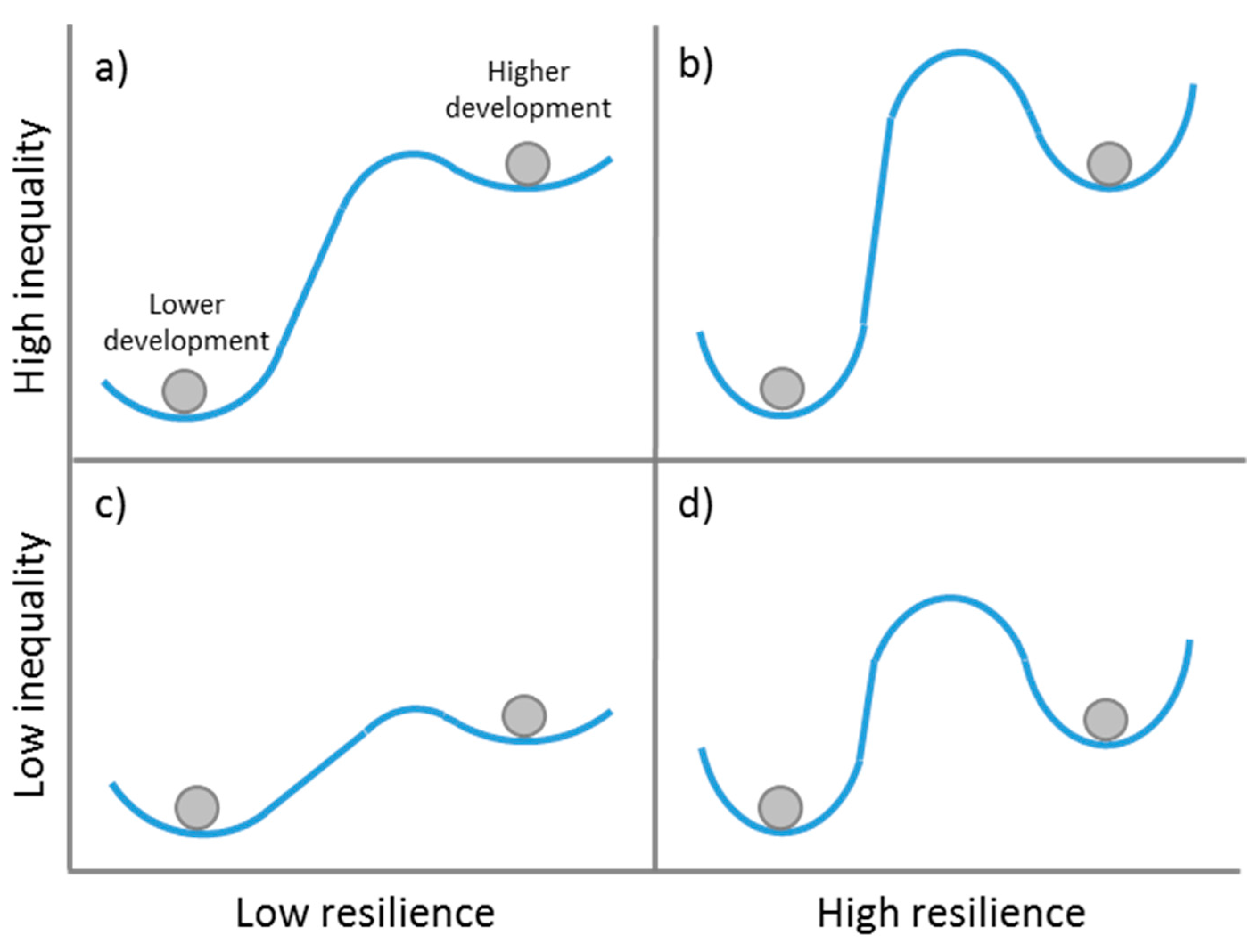
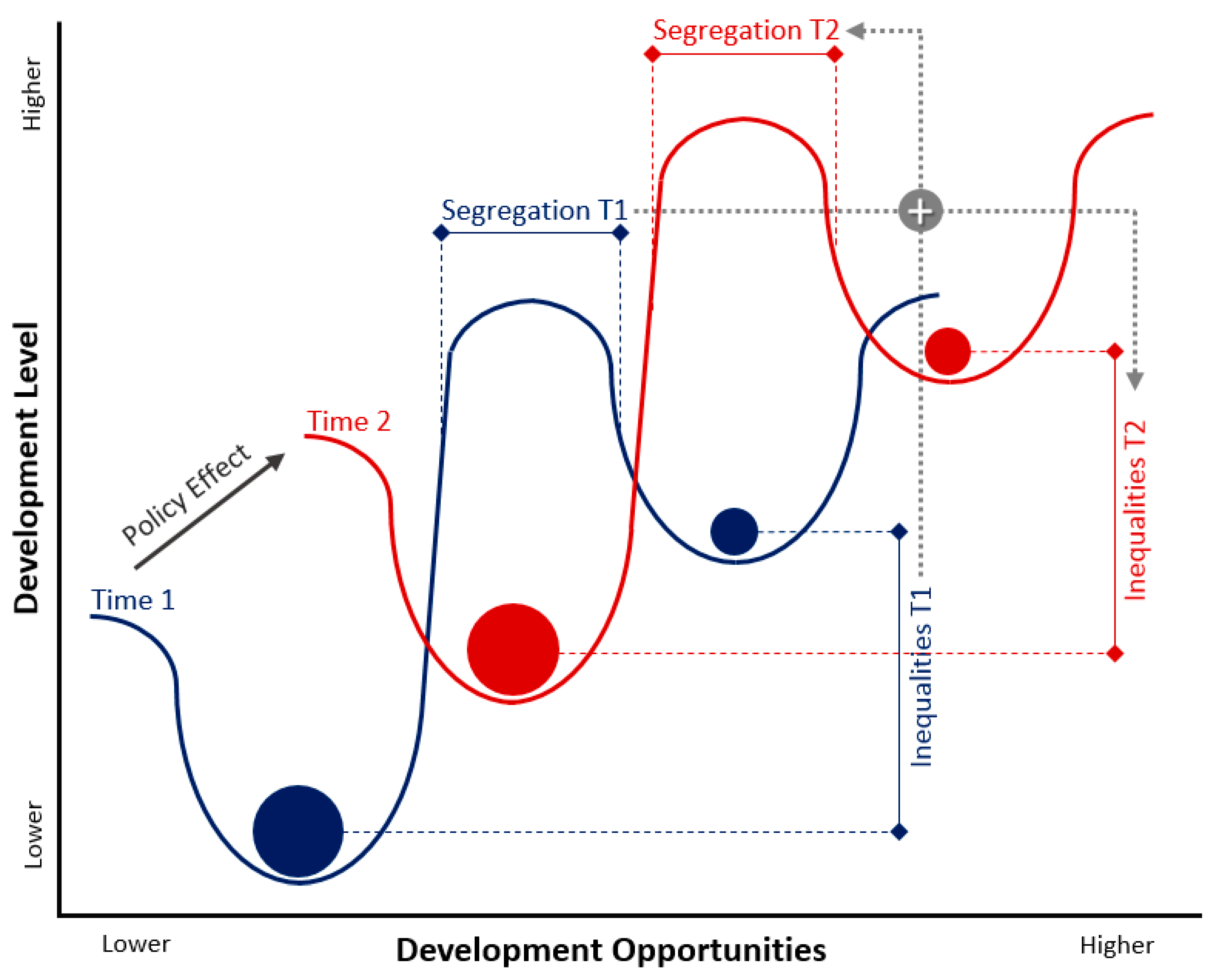
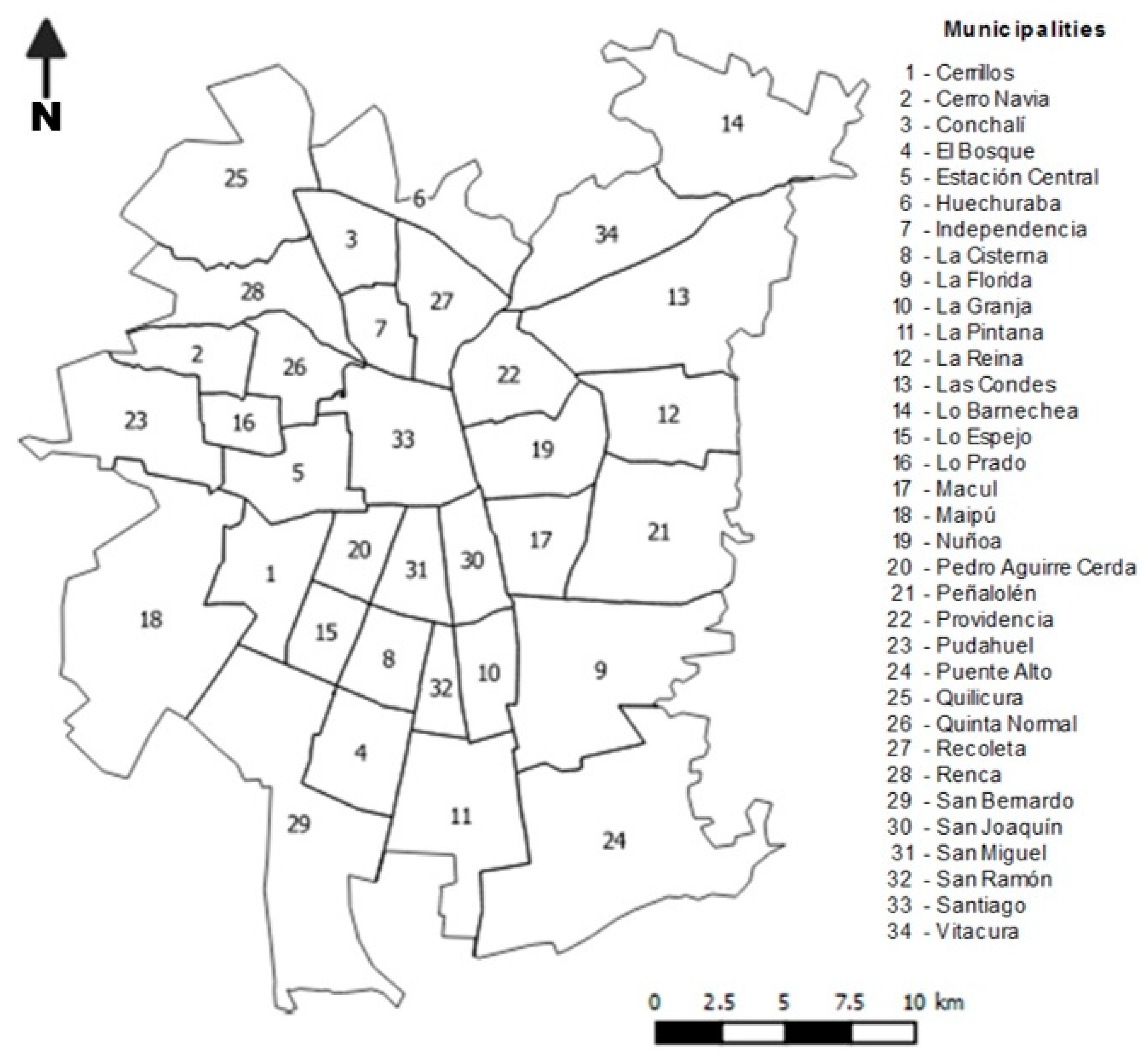
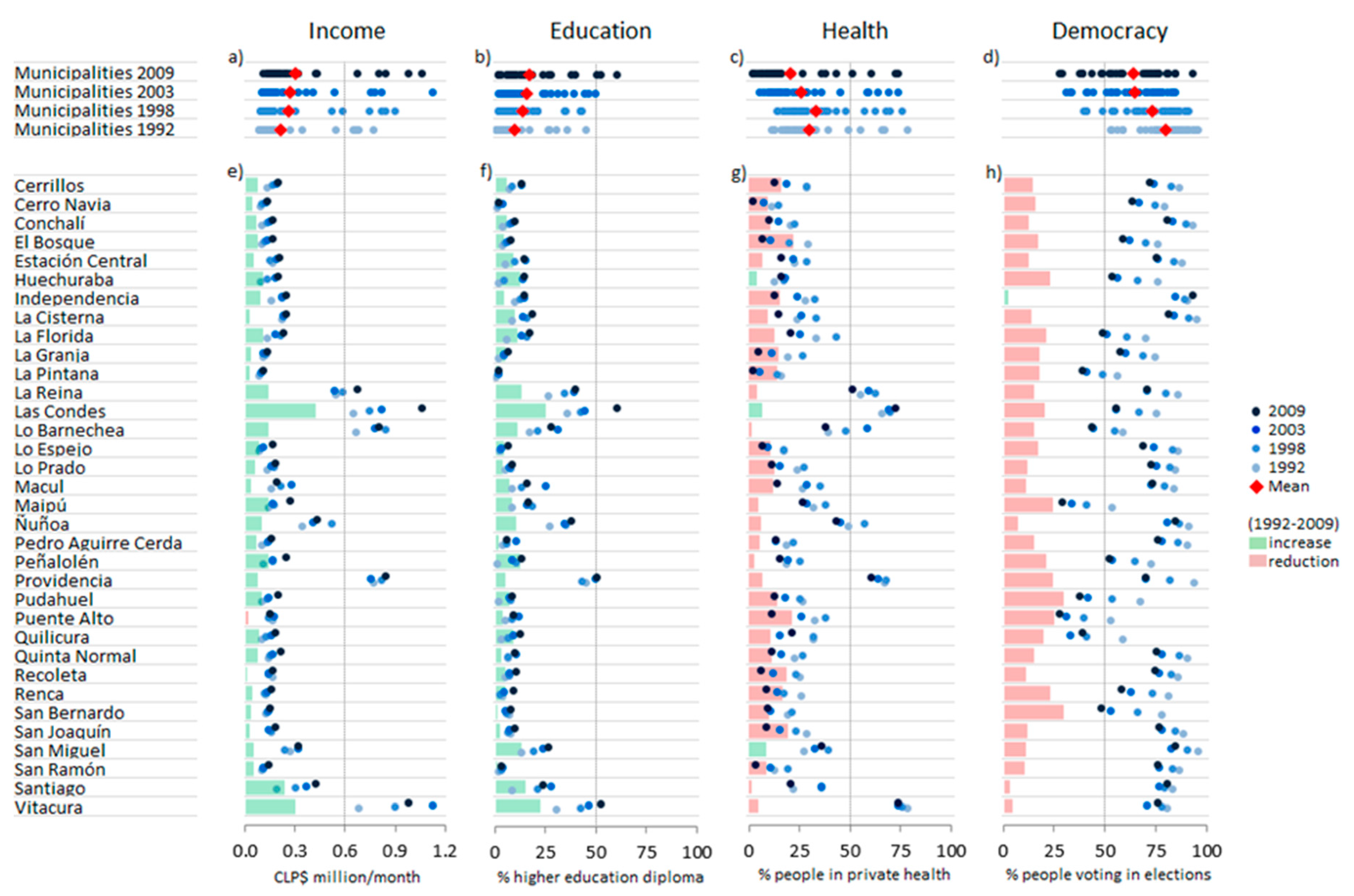
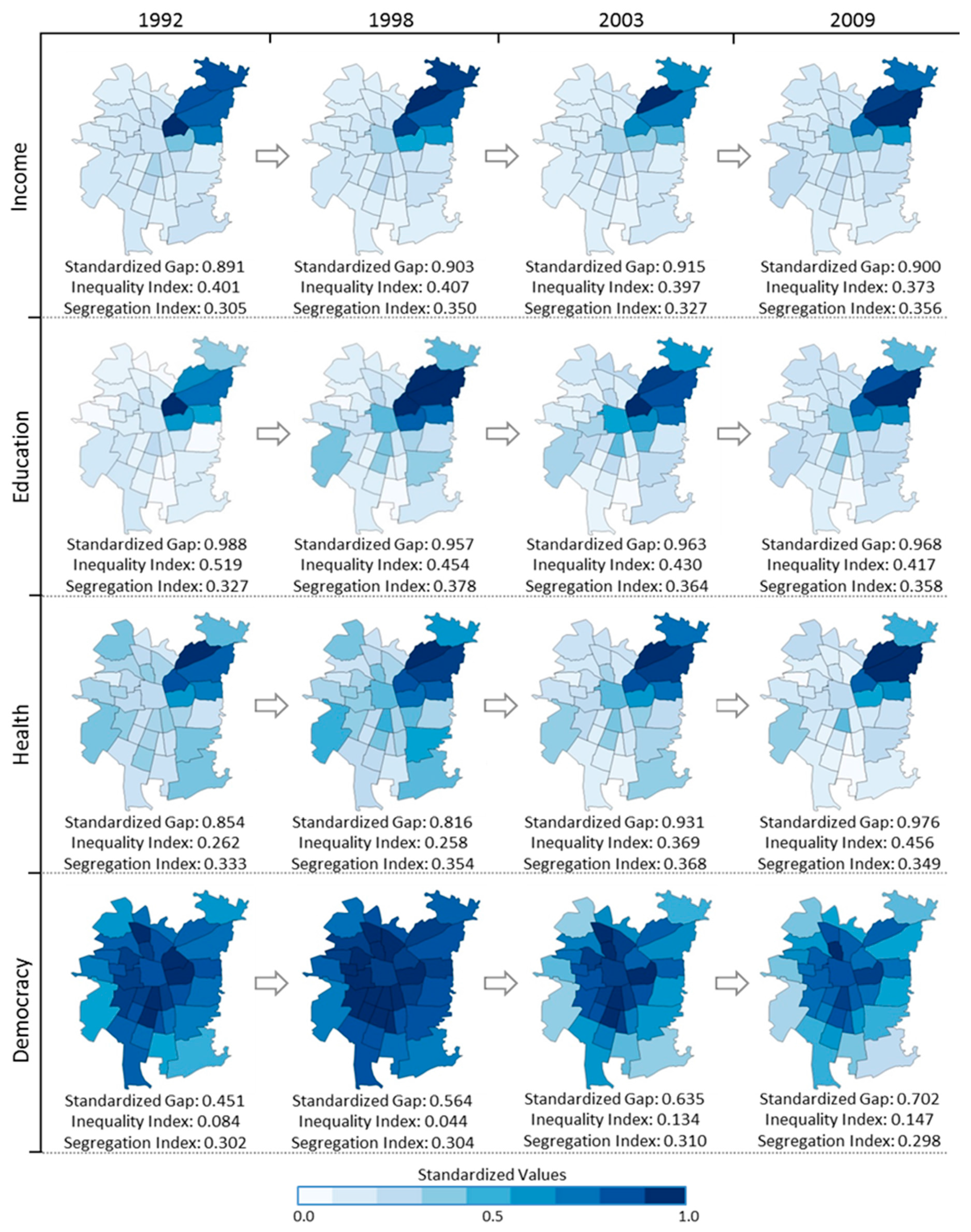
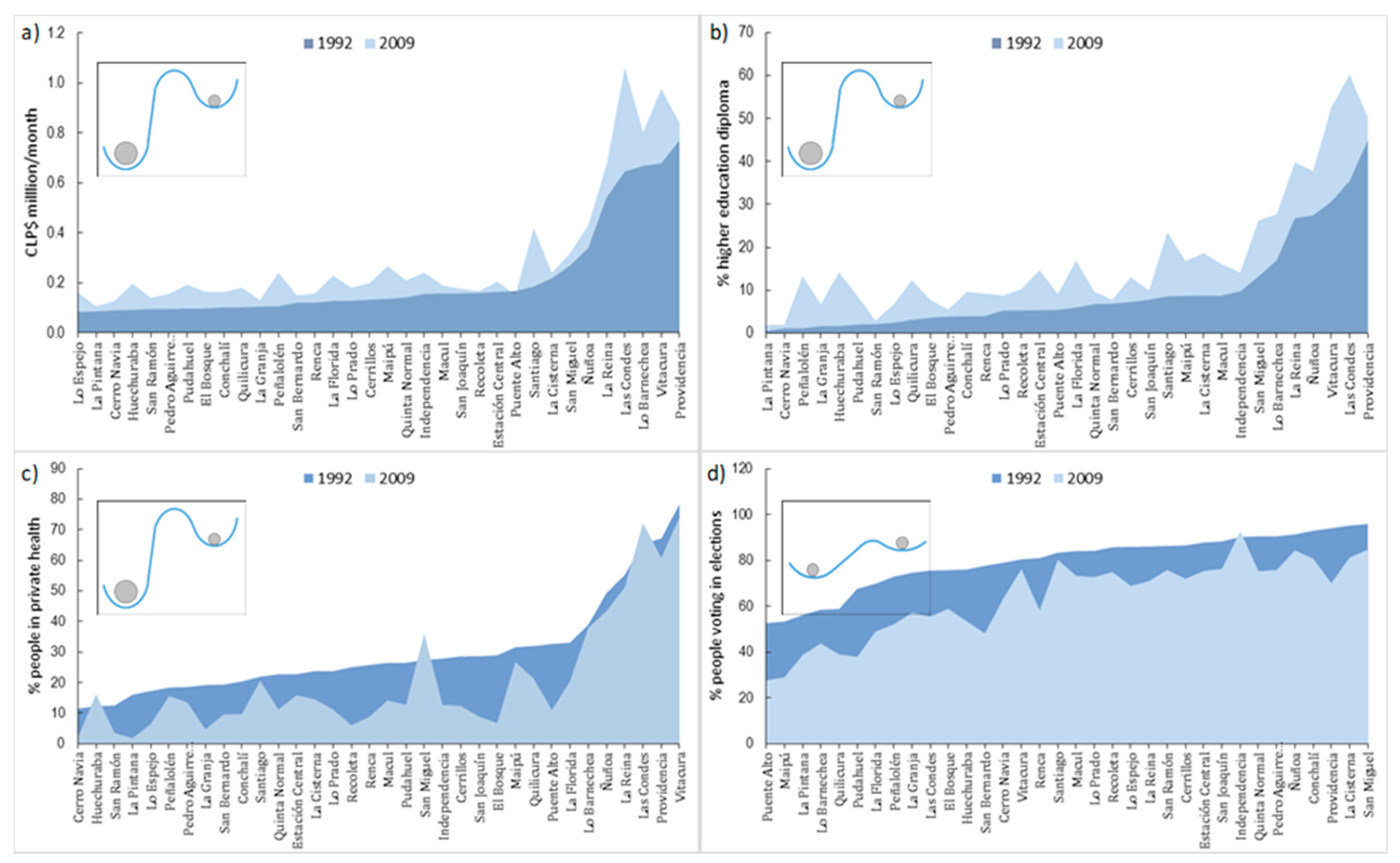
| Income | Education | Health | ||||||||||
|---|---|---|---|---|---|---|---|---|---|---|---|---|
| 1992 | 1998 | 2003 | 2009 | 1992 | 1998 | 2003 | 2009 | 1992 | 1998 | 20003 | 2009 | |
| Education | 0.929 * | 0.908 * | 0.916 * | 0.945 * | ||||||||
| Health | 0.887 * | 0.905 * | 0.954 * | 0.946 * | 0.919 * | 0.970 * | 0.971 * | 0.978 * | ||||
| Democracy | 0.081 | −0.075 | 0.037 | 0.073 | 0.231 | −0.018 | 0.125 | 0.172 | 0.026 | −0.108 | 0.015 | 0.084 |
© 2016 by the authors; licensee MDPI, Basel, Switzerland. This article is an open access article distributed under the terms and conditions of the Creative Commons Attribution (CC-BY) license (http://creativecommons.org/licenses/by/4.0/).
Share and Cite
Fernández, I.C.; Manuel-Navarrete, D.; Torres-Salinas, R. Breaking Resilient Patterns of Inequality in Santiago de Chile: Challenges to Navigate towards a More Sustainable City. Sustainability 2016, 8, 820. https://doi.org/10.3390/su8080820
Fernández IC, Manuel-Navarrete D, Torres-Salinas R. Breaking Resilient Patterns of Inequality in Santiago de Chile: Challenges to Navigate towards a More Sustainable City. Sustainability. 2016; 8(8):820. https://doi.org/10.3390/su8080820
Chicago/Turabian StyleFernández, Ignacio C., David Manuel-Navarrete, and Robinson Torres-Salinas. 2016. "Breaking Resilient Patterns of Inequality in Santiago de Chile: Challenges to Navigate towards a More Sustainable City" Sustainability 8, no. 8: 820. https://doi.org/10.3390/su8080820
APA StyleFernández, I. C., Manuel-Navarrete, D., & Torres-Salinas, R. (2016). Breaking Resilient Patterns of Inequality in Santiago de Chile: Challenges to Navigate towards a More Sustainable City. Sustainability, 8(8), 820. https://doi.org/10.3390/su8080820





